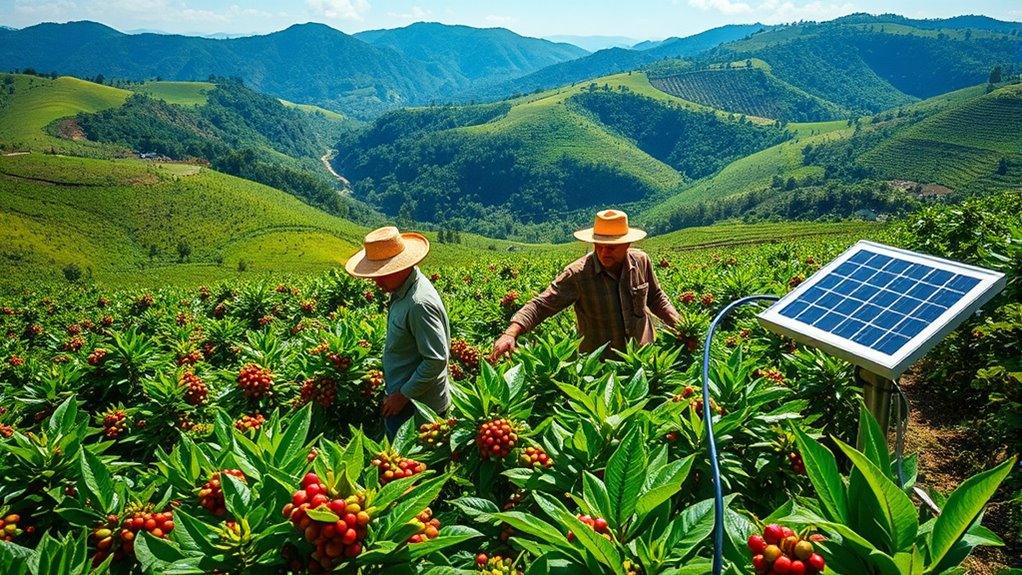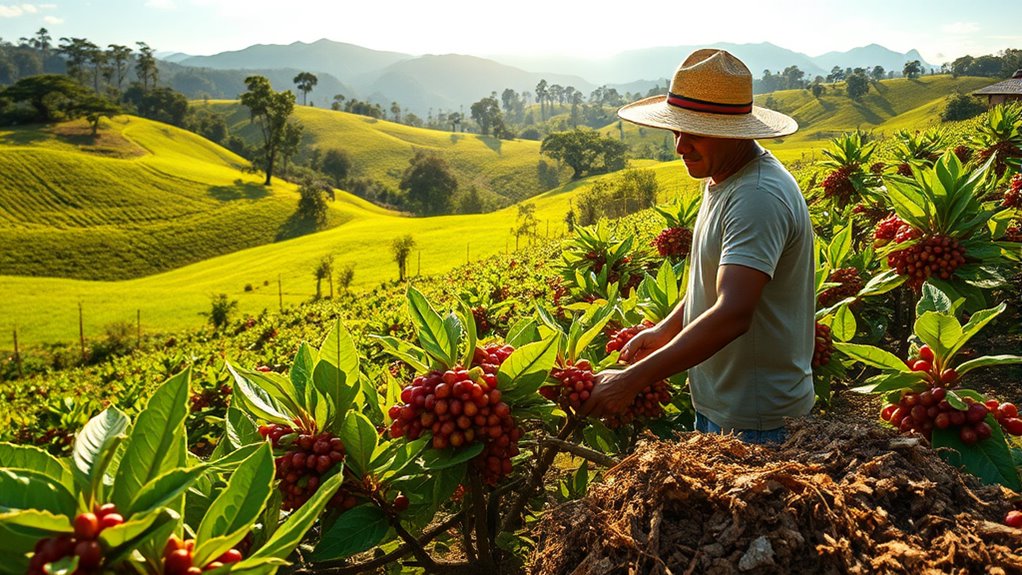To support sustainable coffee farming, choose coffee certified by programs like Rainforest Alliance or C.A.F.E. Practices, which promote environmentally friendly and fair trade practices. You can also buy from brands committed to ethical sourcing, and look for products that emphasize shade-grown techniques and water conservation. Supporting farmer training programs and community efforts helps guarantee long-term land health and social fairness. Keep exploring how your choices can make a bigger impact on the environment and farmers’ livelihoods.
Key Takeaways
- Choose and buy coffee certified by programs like Rainforest Alliance or C.A.F.E. Practices to ensure responsible sourcing.
- Support farmers by purchasing directly from sustainable farms or local cooperatives.
- Promote awareness of sustainable practices to consumers and communities to encourage responsible consumption.
- Advocate for policies and programs that provide technical training and financial support to sustainable coffee farmers.
- Reduce your environmental footprint by conserving water, minimizing waste, and supporting eco-friendly farming initiatives.

Have you ever wondered how your morning coffee can support environmental health and farmer livelihoods? Supporting sustainable coffee farming makes that possible. When you choose coffee produced through sustainable practices, you’re helping reduce the environmental impact of cultivation while supporting farmers who rely on coffee for their income.
Sustainable coffee farming involves adopting environmentally friendly methods like shade-grown coffee, water conservation, and soil protection. Shade-grown coffee, for example, not only preserves biodiversity by maintaining native trees but also provides natural habitat for wildlife, which benefits the entire ecosystem.
Water conservation techniques, such as efficient irrigation and rainwater harvesting, help save vital resources and prevent water pollution. Soil protection practices, including organic fertilization and cover cropping, maintain soil fertility and prevent erosion, ensuring the land remains productive for future harvests.
Engaging with programs like Rainforest Alliance’s AAA Sustainable Quality™ Program and Starbucks’ C.A.F.E. Practices ensures responsible sourcing. These initiatives set standards that promote environmental health and social fairness, directly benefiting farmers’ livelihoods.
When farmers meet these standards, they often gain better access to markets, fair prices, and technical support, which boosts their income and stability. Supporting these programs encourages farmers to adopt sustainable practices that benefit both the environment and their communities.
Investing in farmer training is another key element. Providing education on sustainable techniques such as hand-harvesting, integrated pest management, and soil health improves crop quality and resilience.
When farmers learn to implement these methods, they reduce their reliance on harmful chemicals and minimize environmental degradation. Additionally, community initiatives like planting native shade trees and supporting land conservation can enhance biodiversity and climate resilience on farms.
These efforts help mitigate the impacts of climate change, ensuring farms remain viable over time. Promoting awareness about sustainable practices can motivate more consumers to make responsible choices that support environmental and social well-being.
Partnering with organizations that offer financial support, technical assistance, and market access makes a significant difference.
These collaborations help farmers transition to sustainable methods and maintain them long-term. By investing in their success, you’re contributing to a more sustainable coffee industry that prioritizes environmental health and fair farmer livelihoods.
Frequently Asked Questions
How to Make Coffee Farming Sustainable?
To make coffee farming sustainable, you should adopt eco-friendly practices like shade-grown coffee, organic farming, and water conservation.
Invest in training farmers to boost yields and resilience.
Encourage certification programs such as Fair Trade or Rainforest Alliance to ensure social and environmental standards.
Promote land management that prevents deforestation and protects biodiversity.
Supporting community initiatives like land conservation and farmers’ livelihoods helps create a resilient, sustainable coffee industry for the future.
How Can Coffee Production Be More Sustainable?
You can make coffee production more sustainable by choosing farms with eco-friendly certifications like Rainforest Alliance or Fair Trade. Support farmers who use shade-grown methods, water conservation, and soil protection.
Opt for coffee processed with solar-powered or low-impact technologies. Encourage biodiversity by planting shade trees and participating in conservation efforts.
Additionally, buy directly from farmers or cooperatives that prioritize sustainability, ensuring they get fair premiums and training to continue eco-friendly practices.
What Are Some Possible Sustainable Solutions for Coffee Growers Globally?
You can promote sustainable coffee farming by adopting shade-grown practices that boost biodiversity and water retention. Integrate native trees and crops to increase productivity and soil health.
Use eco-friendly processing methods like solar dryers to cut water use and deforestation. Join certification programs such as Rainforest Alliance or Fair Trade to access better markets and premiums.
Support community land initiatives to conserve habitats and combat climate change, ensuring long-term farm resilience.
How Can We Reduce the Environmental Impact of Coffee Production?
To reduce the environmental impact of coffee production, you can choose shade-grown coffee, which conserves biodiversity and improves flavor.
Support farms using eco-friendly drying technologies like solar power.
Advocate for soil conservation methods such as cover cropping and stumping.
Purchase from certified sustainable sources like Rainforest Alliance or Fair Trade.
Additionally, backing landscape conservation efforts, like forest corridors and carbon-credit programs, helps protect ecosystems and combat climate change.
Conclusion
By choosing sustainably farmed coffee, you directly support farmers who prioritize eco-friendly practices and fair labor conditions. Your purchases encourage the adoption of better farming methods that protect the environment and guarantee fair wages. Every cup you enjoy can make a difference by promoting responsible agriculture and helping communities thrive. So, next time you buy coffee, remember your choice can foster a more sustainable and equitable coffee industry for everyone.









